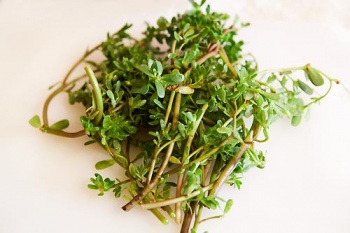Difference between revisions of "Purslane"
From Wikiwel
(→Benefits and uses of Purslane are) |
(→Special Precautions of Purslane) |
||
| Line 2: | Line 2: | ||
Although the FDA classifies purslane as a broad-leaved weed, it's a popular vegetable and herb in many other countries, including China, Mexico, and Greece. | Although the FDA classifies purslane as a broad-leaved weed, it's a popular vegetable and herb in many other countries, including China, Mexico, and Greece. | ||
==Special Precautions of Purslane== | ==Special Precautions of Purslane== | ||
| + | * Use is contraindicated during pregnancy and for those with cold and weak digestion. | ||
| + | |||
==Benefits and uses of Purslane are== | ==Benefits and uses of Purslane are== | ||
* Cardiovascular disease : Purslane has the highest amount of heart-healthy omega-3 fats of any edible plant, according to researchers at the University of Texas at San Antonio. Purslane leaves (which can be eaten as a cooked vegetable) contain more omega-3 fatty acids than any other edible plant, making them good for improving brain and cardiovascular function. | * Cardiovascular disease : Purslane has the highest amount of heart-healthy omega-3 fats of any edible plant, according to researchers at the University of Texas at San Antonio. Purslane leaves (which can be eaten as a cooked vegetable) contain more omega-3 fatty acids than any other edible plant, making them good for improving brain and cardiovascular function. | ||
Revision as of 02:41, 26 April 2014
Other names : Portulaca oleracea, common purslane, verdolaga, pigweed, little hogweed, Pursley, Moss rose, Ma Chi XianAlthough the FDA classifies purslane as a broad-leaved weed, it's a popular vegetable and herb in many other countries, including China, Mexico, and Greece.
Special Precautions of Purslane
- Use is contraindicated during pregnancy and for those with cold and weak digestion.
Benefits and uses of Purslane are
- Cardiovascular disease : Purslane has the highest amount of heart-healthy omega-3 fats of any edible plant, according to researchers at the University of Texas at San Antonio. Purslane leaves (which can be eaten as a cooked vegetable) contain more omega-3 fatty acids than any other edible plant, making them good for improving brain and cardiovascular function.
- Cancer : Researchers discovered that purslane contains between 10 and 20 times more of the cancer-inhibiting antioxidant, melatonin, than any other fruit or vegetable tested! And a rare subclass of Homoisoflavonoids, from the plant, showed in vitro cytotoxic activities towards four human cancer cell lines
- Betacyanins isolated from Portulaca oleracea improved cognition deficits in aged mice.
